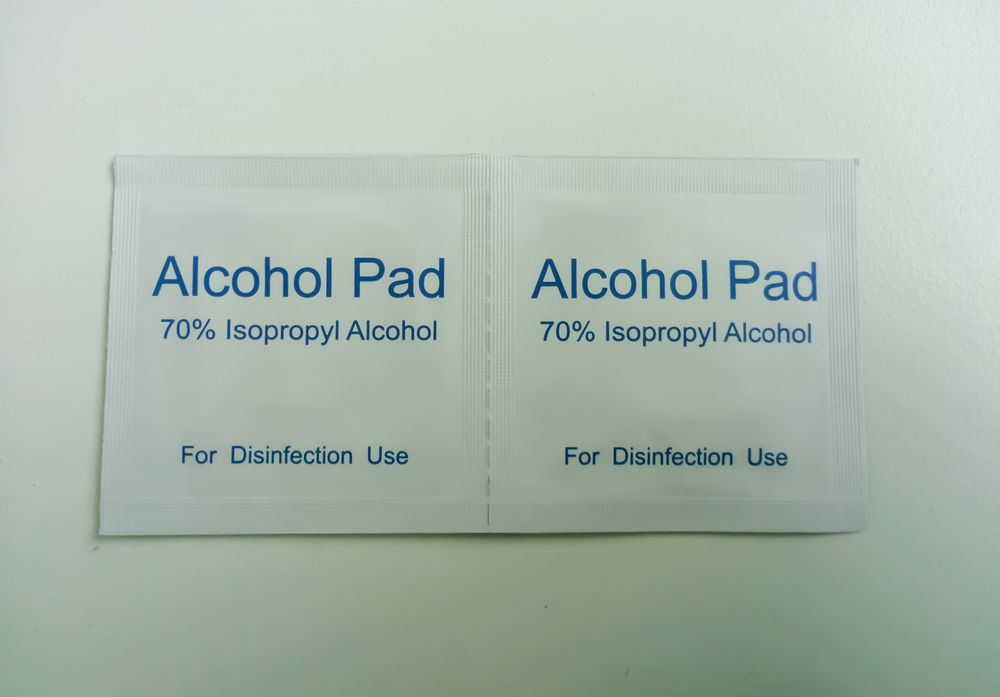Isopropyl wipes are typically composed of a polyester fabric that is durable and free of lint. These wipes are
saturated with a mixture of isopropyl alcohol and deionized water. The percentage of alcohol in the solution
varies based on the product, with higher percentages indicating a greater amount of alcohol. Despite
this, isopropyl wipes with a 70% alcohol concentration are more effective in eliminating pathogens than those with a 90% concentration. The reason for this is that the additional water in the solution helps to slow down the chemical reaction, which allows the alcohol to more effectively infiltrate the pathogens more.
What is the application of Isopropyl Wipes?
Isopropyl wipes can be used in a wide range of applications, including Alcohol wipes are a versatile tool for cleaning a wide range of surfaces in various settings. They are particularly useful for high-touch areas that are more prone to collecting dirt, bacteria, and germs, such as fiber optics, hard surfaces, keyboards, and display screens. Using alcohol wipes on these surfaces can help to reduce the number of bacteria that accumulates over time.
In addition to high-touch areas, alcohol wipes are also effective for cleaning optical surfaces, such as
eyeglasses, glassware, windows, and lab equipment used in chemistry. These wipes are often made with
distilled or deionized water to prevent streaks and watermarks, ensuring that the cleaned surfaces are clear
and free of any residue. Residue build-up can occur over time, especially from tasks like printing shipping
labels, and using alcohol wipes can help break down residue and prevent build-up.
They were cleaning electronic devices, including smartphones, tablets, computer accessories, display screens,
and smartwatches. Lint, residue, and fingerprints can impact the way devices look and operate, but regular
use of alcohol wipes can help keep them free of residue. Alcohol wipes can eliminate strong odors and leave
household items feeling fresh.
Cleaning jewelry, including necklaces, rings, bracelets, earrings, and pendants. Alcohol wipes can help keep
jewelry hygienic by removing dirt and bacteria.
Cleaning oil, dust, and other contaminants from various surfaces, including makeup brushes, dry-erase boards, sponges, mirrors, tile, stainless steel, sinks, blinds, and chrome. Alcohol wipes can also be used as a deodorant, astringent, liniment, antiseptic, and disinfectant due to their versatility.
Can you get an allergy after using alcohol wipes?
Rubbing alcohol or isopropyl wipes may cause an allergic reaction in some people, which can be identified by symptoms such as hives, difficulty breathing, and swelling of the face, tongue, or throat. It’s important to seek medical attention immediately in case of an allergic reaction, such as anaphylaxis, a severe and life-threatening an allergic reaction may occur in rare cases. Seek emergency care if you experience loss of consciousness, stopped breathing, or severe swelling of the face, tongue, or throat.
While isopropyl wipes can be a convenient way to sanitize and clean surfaces, it’s important to be aware of
the potential risks of an allergic reaction. However, they can also help reduce the spread of diseases in public
spaces by removing bacteria and residue from high-touch areas.
Is it safe to use isopropyl wipes?
Isopropyl wipes are commonly used to sanitize bug bites or care for pierced ears, but they can potentially
harm vulnerable tissue if used on injuries. To cleanse a minor injury, the National Health Service (NHS)
recommends the following steps:
- Rinse the cut, scrape, or wound in running water for five to ten minutes.
- Soak a piece of gauze or cloth in water or saline solution.
- Gently dab the skin with the soaked cloth.
- Use a clean towel or tissue.
- Apply a sterile dressing and apply pressure if necessary.
- It’s important to follow these steps to ensure proper care for the wound and prevent further complications. While alcohol wipes may seem like a convenient option, it’s best to avoid using them on injuries to prevent any potential harm to the skin.
Some more facts about isopropyl
Isopropyl alcohol (IPA) is generally considered safe if proper handling procedures are followed, but due to its
flammable nature, precautions should be taken to prevent any potential hazards. The Safety Data Sheet (SDS)
is a key resource for all safety requirements related to the use of IPA, and it should be readily accessible
whenever and wherever IPA is used.
Final say
These are some of the incredible information that you need to remember while using isopropyl wipes.

